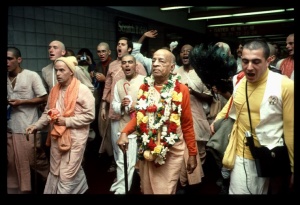CC Madhya 20.57 (1975): Difference between revisions
(Vanibot #0027: CCMirror - Mirror CC's 1996 edition to form a basis for 1975) |
(Vanibot #0020: VersionCompareLinker - added a link to the Version Compare feature) |
||
| Line 2: | Line 2: | ||
<div style="float:left">'''[[Sri Caitanya-caritamrta (1975)|Śrī Caitanya-caritāmṛta (1975)]] - [[CC Madhya (1975)|Madhya-līlā]] - [[CC Madhya 20 (1975)|Chapter 20: Lord Śrī Caitanya Mahāprabhu Instructs Sanātana Gosvāmī in the Science of the Absolute Truth]]'''</div> | <div style="float:left">'''[[Sri Caitanya-caritamrta (1975)|Śrī Caitanya-caritāmṛta (1975)]] - [[CC Madhya (1975)|Madhya-līlā]] - [[CC Madhya 20 (1975)|Chapter 20: Lord Śrī Caitanya Mahāprabhu Instructs Sanātana Gosvāmī in the Science of the Absolute Truth]]'''</div> | ||
<div style="float:right">[[File:Go-previous.png|link=CC Madhya 20.56 (1975)|Madhya-līlā 20.56]] '''[[CC Madhya 20.56 (1975)|Madhya-līlā 20.56]] - [[CC Madhya 20.58 (1975)|Madhya-līlā 20.58]]''' [[File:Go-next.png|link=CC Madhya 20.58 (1975)|Madhya-līlā 20.58]]</div> | <div style="float:right">[[File:Go-previous.png|link=CC Madhya 20.56 (1975)|Madhya-līlā 20.56]] '''[[CC Madhya 20.56 (1975)|Madhya-līlā 20.56]] - [[CC Madhya 20.58 (1975)|Madhya-līlā 20.58]]''' [[File:Go-next.png|link=CC Madhya 20.58 (1975)|Madhya-līlā 20.58]]</div> | ||
{{CompareVersions|CC|Madhya 20.57|CC 1975|CC 1996}} | |||
{{RandomImage}} | {{RandomImage}} | ||
==== TEXT 57 ==== | ==== TEXT 57 ==== | ||
| Line 27: | Line 26: | ||
<div class="translation"> | <div class="translation"> | ||
" 'Saints of your caliber are themselves places of pilgrimage. Because of their purity, they are constant companions of the Lord, and therefore they can purify even the places of pilgrimage.' | |||
</div> | </div> | ||
| Line 34: | Line 33: | ||
<div class="purport"> | <div class="purport"> | ||
This verse was spoken by Mahārāja Yudhiṣṭhira to Vidura in Śrīmad-Bhāgavatam ([[SB 1.13.10]]). Vidura was returning home after visiting sacred places of pilgrimage, and Mahārāja Yudhiṣṭhira was receiving his saintly uncle. In essence, Mahārāja Yudhiṣṭhira was saying, | This verse was spoken by Mahārāja Yudhiṣṭhira to Vidura in Śrīmad-Bhāgavatam ([[SB 1.13.10|1.13.10]]). Vidura was returning home after visiting sacred places of pilgrimage, and Mahārāja Yudhiṣṭhira was receiving his saintly uncle. In essence, Mahārāja Yudhiṣṭhira was saying, "My dear Lord Vidura, you yourself are a holy place because you are an advanced devotee. People like you always carry Lord Viṣṇu in their hearts. You can revitalize all holy places after they have been polluted by the pilgrimages of sinners." | ||
A sinful person goes to a holy place of pilgrimage to be purified. In a holy place, there are many saintly people and temples of Lord Viṣṇu; however, the holy place becomes infected with the sins of many visitors. When an advanced devotee goes to a holy place, he counteracts all the sins of the pilgrims. Therefore Mahārāja Yudhiṣṭhira addressed Vidura in this way. | A sinful person goes to a holy place of pilgrimage to be purified. In a holy place, there are many saintly people and temples of Lord Viṣṇu; however, the holy place becomes infected with the sins of many visitors. When an advanced devotee goes to a holy place, he counteracts all the sins of the pilgrims. Therefore Mahārāja Yudhiṣṭhira addressed Vidura in this way. | ||
Latest revision as of 13:34, 27 January 2020

A.C. Bhaktivedanta Swami Prabhupada
TEXT 57
- bhavad-vidhā bhāgavatās
- tīrtha-bhūtāḥ svayaṁ prabho
- tīrthī-kurvanti tīrthāni
- svāntaḥ-sthena gadā-bhṛtā
SYNONYMS
bhavat-vidhāḥ—like you; bhāgavatāḥ—advanced devotees; tīrtha-bhūtāḥ—personified holy places of pilgrimage; svayam—personally; prabho—my lord; tīrthī-kurvanti—make into holy places; tīrthāni—all the holy places of pilgrimage; sva-antaḥ-sthena—situated within their hearts; gadā-bhṛtā—by Lord Viṣṇu, who carries a club.
TRANSLATION
" 'Saints of your caliber are themselves places of pilgrimage. Because of their purity, they are constant companions of the Lord, and therefore they can purify even the places of pilgrimage.'
PURPORT
This verse was spoken by Mahārāja Yudhiṣṭhira to Vidura in Śrīmad-Bhāgavatam (1.13.10). Vidura was returning home after visiting sacred places of pilgrimage, and Mahārāja Yudhiṣṭhira was receiving his saintly uncle. In essence, Mahārāja Yudhiṣṭhira was saying, "My dear Lord Vidura, you yourself are a holy place because you are an advanced devotee. People like you always carry Lord Viṣṇu in their hearts. You can revitalize all holy places after they have been polluted by the pilgrimages of sinners."
A sinful person goes to a holy place of pilgrimage to be purified. In a holy place, there are many saintly people and temples of Lord Viṣṇu; however, the holy place becomes infected with the sins of many visitors. When an advanced devotee goes to a holy place, he counteracts all the sins of the pilgrims. Therefore Mahārāja Yudhiṣṭhira addressed Vidura in this way.
Since an advanced devotee carries Lord Viṣṇu within his heart, he is a moving temple and a moving Viṣṇu. An advanced devotee does not need to go to holy places, for wherever he stays is a holy place. In this connection, Narottama dāsa Ṭhākura states, tīrtha-yātrā pariśrama, kevala manera bhrama: visiting holy places is simply another type of bewilderment. Since an advanced devotee does not need to go to a holy place, why does he go? The answer is that he goes simply to purify the place.